Achievements in “Doi moi” Period
22/2/16
Nearly 30 years after “Doi moi” (Renewal) initiated in 1986, Vietnam has gotten out of a post-war serious socio-economic crisis, gradually doing away with poverty and backwardness, embarking upon national industrialisation and modernisation and taking an initiative in international integration.
At the international workshop entitled “Economic Reform for Growth and Sustainability: International Experiences and Lessons for Vietnam”, jointly organised by the Vietnamese Foreign Ministry, Vietnam Academy of Social Sciences and the United Nations Development Program (UNDP), Helen Clark, UNDP General Director, confirmed that the socio-economic achievements attained by Vietnam over nearly 30 years were very impressive.
She held that with the average annual growth rate of 7.3% from 1990 to 2010, Vietnam was a first-rank fast- growing economy with an average per-head income at the end of these two decades increasing by nearly five fold over that at the beginning of the period. The rate of extremely poor people dropped from 63.7% in 1993 to 4.3% in 2010.
Over 97% of the Vietnamese families have been supplied with electricity or other energy sources. Important progress was also recorded in gender equality, education, employment and healthcare.
Helen Clark evaluated Vietnam as having many advantages such as a relatively young and competitive work force, rich natural resources and a geographical position in the centre of a dynamic region. She believed that with its clever policy selection, Vietnam has a bright future.
In February of this year, the Vietnamese Embassy in France coordinated with the Asia Studies Centre of the International French Relations Institute (IFRI) in organising the seminar “Vietnam Economic Reform: The Role of New Strategic Partners”.
At the seminar, attorney Oliver Massmann, General Director of Duane Morris Vietnam LLC law firm, provided through his speech the participants with Vietnam’s economic picture with positive and encouraging results in 2014. He spoke of the positive changes in Vietnam during his 25 years’ living and working there.
From an extremely poor country which had to import rice when he arrived in the country in 1990, Vietnam has become one of the top rice-exporting countries in the world. He expressed optimism about the current reforms and his belief that many reforms would be furthered in the coming period, which will help Vietnam take firm steps forward in the future.
Later, in April of the same year, an international workshop themed “Vietnam– 40 Years of Reunification, Development and Integration (1975-2015)” was jointly organised by the University of Social Sciences and Humanities (Vietnam National University - Ho Chi Minh City), Thu Dau Mot University (Binh Duong province), the University of Social Sciences and Humanities University (Vietnam National University - Hanoi) and the Sciences School of Hue University.
The workshop attracted many scientists and research institutions with more than 300 allocutions, including 20 presented by scholars from the United States, France, Australia, Brazil, the Republic of Korea, China, India, and Malaysia.
Many scholars and researchers at the workshop shared this assessment: For 30 years now, Vietnam has travelled on “Doi moi” road, recording many achievements in various domains, including economics, society, culture, politics, security and defense.
At present, Vietnam is embarking upon industrialisation and modernisation, having developed at a fast rate and on a larger and more comprehensive scale as required by the progressive development of national history. However, a number of scholars and researchers pointed to the challenges of a globalisation trend, which should be comprehensively identified by Vietnam for appropriate solutions.
Addressing the workshop, Prof., Dr.Tsuboi Yoshiharu, from the Waseda University of Japan, held that the international environment around Vietnam developed quickly, such as the ASEAN Economic Community being in the process of formation and the Trans-Pacific Partnership (TPP) talks have neared the end.
To him, Vietnam should adopt a longer vision with 30-year or 50-year plans instead of 5-year or 10-year plans as before. He said that Vietnam could put forward a specific vision for 50 years to come so as to become a nation playing an important role among the ASEAN countries and having a position in the world.
She held that with the average annual growth rate of 7.3% from 1990 to 2010, Vietnam was a first-rank fast- growing economy with an average per-head income at the end of these two decades increasing by nearly five fold over that at the beginning of the period. The rate of extremely poor people dropped from 63.7% in 1993 to 4.3% in 2010.
Over 97% of the Vietnamese families have been supplied with electricity or other energy sources. Important progress was also recorded in gender equality, education, employment and healthcare.
Helen Clark evaluated Vietnam as having many advantages such as a relatively young and competitive work force, rich natural resources and a geographical position in the centre of a dynamic region. She believed that with its clever policy selection, Vietnam has a bright future.
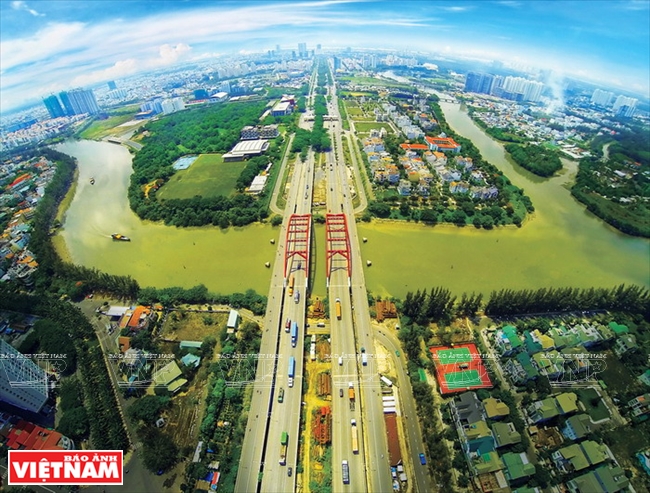 After 30 years of “Doi moi”, some cities in Vietnam such as Ho Chi Minh City have become new-styled and modern urban areas of regional stature. Photo: Nguyen Minh Tan 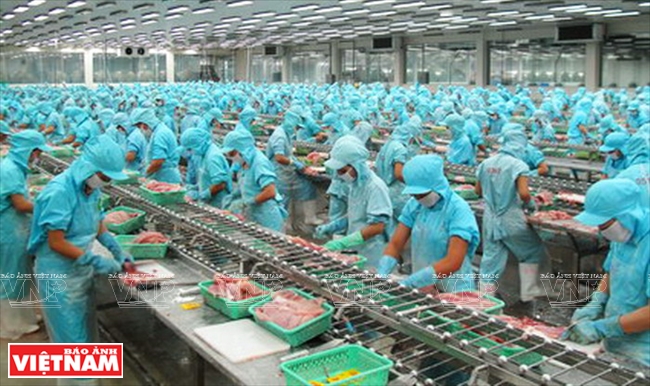 Vietnam has exported many agricultural and aquatic products which are prestigious brand names in foreign markets. Photo: VNP’s file 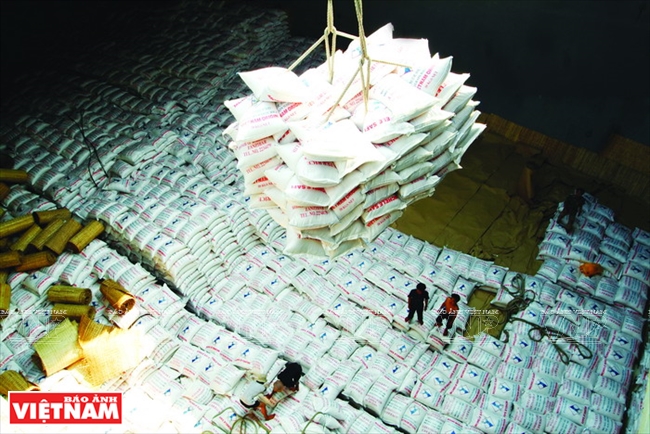 From a rice importer in the 90s, Vietnam has now become one of the top rice exporters in the world. Photo: VNP’s file 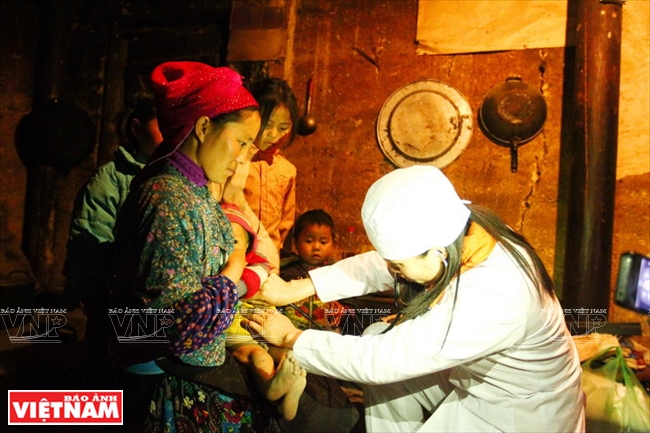 In terms of healthcare, medical treatment is provided for ethnic groups in every hamlet in remote areas. Photo: Hoang Ha/VNP 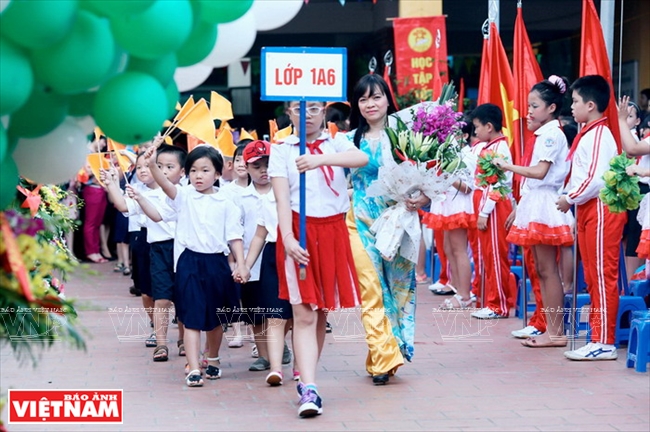 The education sector has seen basic and comprehensive reforms, meeting the demand for society’s development. Photo: Hoang Ha/VNP 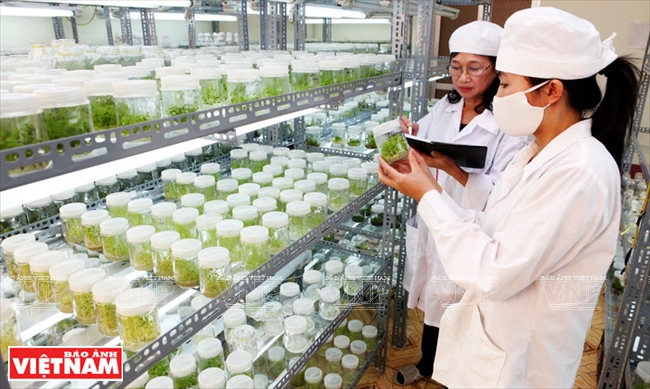 Vietnam promotes research and high - tech application to agricultural production. Photo: Anh Tuan/VNA 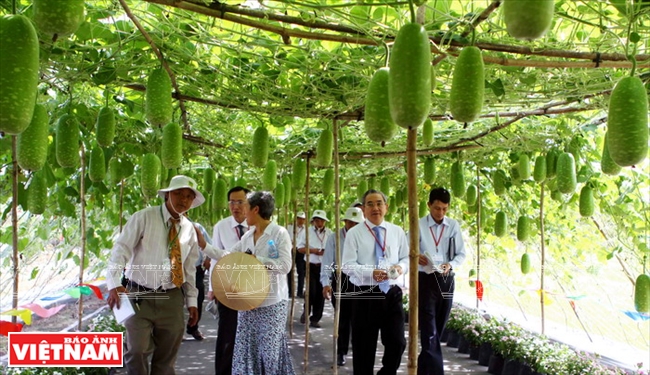 The model of growing F1 hybrid gourd at the Hi-tech Agricultural Area in Ho Chi Minh City. Photo: Thanh Vu/VNA |
In February of this year, the Vietnamese Embassy in France coordinated with the Asia Studies Centre of the International French Relations Institute (IFRI) in organising the seminar “Vietnam Economic Reform: The Role of New Strategic Partners”.
At the seminar, attorney Oliver Massmann, General Director of Duane Morris Vietnam LLC law firm, provided through his speech the participants with Vietnam’s economic picture with positive and encouraging results in 2014. He spoke of the positive changes in Vietnam during his 25 years’ living and working there.
From an extremely poor country which had to import rice when he arrived in the country in 1990, Vietnam has become one of the top rice-exporting countries in the world. He expressed optimism about the current reforms and his belief that many reforms would be furthered in the coming period, which will help Vietnam take firm steps forward in the future.
Later, in April of the same year, an international workshop themed “Vietnam– 40 Years of Reunification, Development and Integration (1975-2015)” was jointly organised by the University of Social Sciences and Humanities (Vietnam National University - Ho Chi Minh City), Thu Dau Mot University (Binh Duong province), the University of Social Sciences and Humanities University (Vietnam National University - Hanoi) and the Sciences School of Hue University.
The workshop attracted many scientists and research institutions with more than 300 allocutions, including 20 presented by scholars from the United States, France, Australia, Brazil, the Republic of Korea, China, India, and Malaysia.
Many scholars and researchers at the workshop shared this assessment: For 30 years now, Vietnam has travelled on “Doi moi” road, recording many achievements in various domains, including economics, society, culture, politics, security and defense.
At present, Vietnam is embarking upon industrialisation and modernisation, having developed at a fast rate and on a larger and more comprehensive scale as required by the progressive development of national history. However, a number of scholars and researchers pointed to the challenges of a globalisation trend, which should be comprehensively identified by Vietnam for appropriate solutions.
Addressing the workshop, Prof., Dr.Tsuboi Yoshiharu, from the Waseda University of Japan, held that the international environment around Vietnam developed quickly, such as the ASEAN Economic Community being in the process of formation and the Trans-Pacific Partnership (TPP) talks have neared the end.
To him, Vietnam should adopt a longer vision with 30-year or 50-year plans instead of 5-year or 10-year plans as before. He said that Vietnam could put forward a specific vision for 50 years to come so as to become a nation playing an important role among the ASEAN countries and having a position in the world.

Popular Posts
-
Religion is a part of the spiritual life in society, this phenomenon of the superstructure has been strongly changed with economic - social...
-
Vietnam has just done well for the second cycle of Universal Periodical Review (UPR) in Geneva, Switzerland. So, what’s the UPR? an...
-
Representatives from foreign countries congratulate Viet Nam on its election to the Human Rights Council for the first time on November ...
-
A street flowers vendor in Hanoi Another new spring has come to Vietnam, bring...
-
Thai people in Shutdown Bangkok protests Not until this crisis, we have realized the ne...
-
If nothing changes, there will be a preferential credit program with hundreds of thousands billion of capital for agriculture and r...
-
Recently, several anti-governmental individuals have established series of illegal groups and organizations in the name of civil soci...
-
Child sexual abuse has been on the increase in Vietnam in recent years according to the Ministry of Labour, Invalids and Social Affairs....
Blog Archive
-
▼
2016
(
423
)
-
▼
tháng 2
(
37
)
- International community affirms 12th National Part...
- State President kicks off Homeland Spring program
- Flag issue: Is it worth hanging on an out-of-date ...
- Could Vietnam become the next Silicon Valley?
- Party leader conveys Tet greetings to entire people
- A new milestone on the renewal path
- Vietnam as a model for protecting national interests
- Public healthcare goes long way after “Doi Moi”
- The fierce competition in Africa (Part 1)
- The fierce competition in Africa (Part 2 and end)
- Time to innovate political system
- Strengthening the position of national culture in ...
- Disadvantaged communes to receive aid from government
- Human rights crisis in America: Inequality, class ...
- A beautiful and friendly Vietnam in the eyes of fo...
- “No Party’s leadership over economic affairs” – a ...
- South China Sea: New Chinese missile base on dispu...
- History made: Vietnam shock Asian champions Japan ...
- International friends praise Vietnam’s renewal ach...
- Achievements in socio-economic development-eloquen...
- Vietnam’s human rights achievement after 30 years ...
- Vietnam requests China to end Hoang Sa sovereignty...
- Prisoners of Conscience: A term that is being abused!
- Loan limit for disadvantaged students increased
- Achievements in “Doi moi” Period
- French Ambassador impressed by Vietnam development...
- The message of the President’s Lang Son martyrs ce...
- Right to silence completes a law system for human ...
- Opportunity and challenge
- The steady progress of Vietnam Social Insurance
- Motivation for sustainable growth
- Fight against a World War III: Build an Internatio...
- World Bank: Vietnam faces opportunities for a brig...
- Vietnam continues to work with UNDP to realize SDG...
- “Let’s make Vietnam to be the worth-to-live land”
- 10 shameful truths of the modern society
- Promoting the women participation in elected offic...
-
▼
tháng 2
(
37
)

 Viet Nam Human Rights
Viet Nam Human Rights








All comments [ 10 ]
Looking back at the last period, since the country embarked on the process of Doi Moi (Reform) in 1986, Viet Nam has achieved spectacular results in socio-economic development.
Viet Nam has made lots of progress in the transition from a centrally planned economy to a market economy with socialism orientation.
Liberalization of prices was initiated since the mid 80s and by the beginning of the 1990s. Prices of most commodities were in principle set by the market;
Viet Nam is now one of top world exporters in rice, rubber, coffee, pepper, cashew nuts, timber and fisheries.
Thanks to the rapid growth rate, in only two decades, nearly 30 million people were lifted out of poverty.
Viet Nam’s Reform process was accompanied by a period of liberalization and international integration
Thanks to the open door policy, Viet Nam normalized relations with the World Bank, International Monetary Fund, Asia Development Bank.
Being connected with the world economy, Vietnamese economy is vulnerable to any changes of the world economy.
obstacles need to be removed also as the development of institutions that are necessary to promote the development of labor market and livelihood for unskilled and vulnerable workers are vital.
to improvements of outcomes relating to decent employment, the social protection system needs to be continually expanded and improved to enhance peoples’ access to important social services.
Your comments